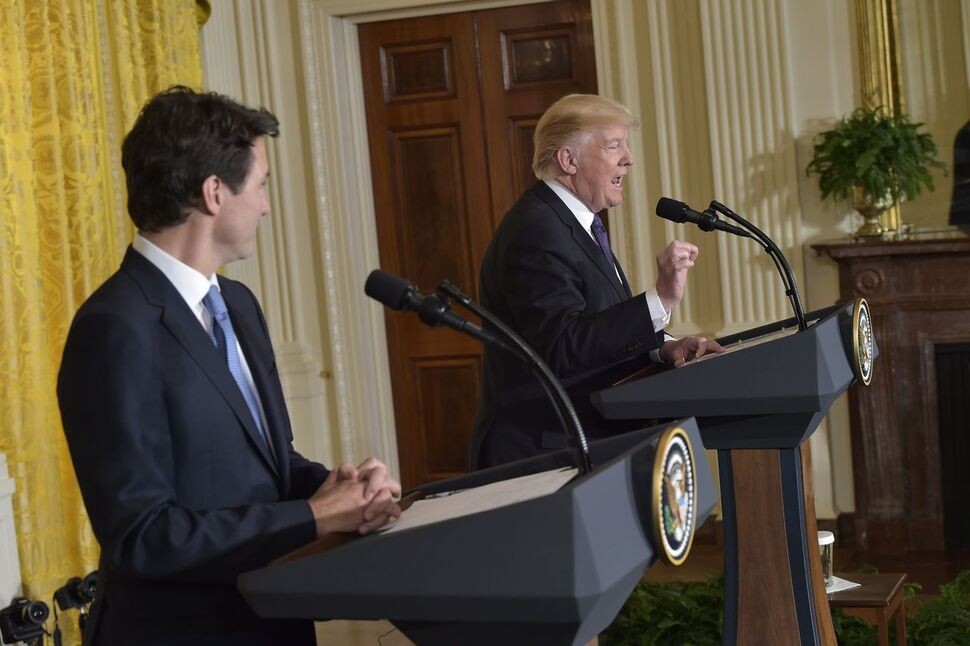hankyoreh
Links to other country sites 다른 나라 사이트 링크
[Analysis] Trump administration shows growing discomfort with North Korea

On Feb. 13, US President Donald Trump responded to North Korea’s ballistic missile launch by saying that he would “deal with North Korea very strongly.” His tone was tougher than when he said during his emergency joint press conference with Japanese Prime Minister Shinzo Abe on Feb. 11 that he stood fully behind his Japanese ally without specifically mentioning North Korea. When asked on Feb. 13 during a joint press conference following his summit at the White House with Canadian Prime Minister Justin Trudeau about the most important national security issues facing the US, Trumps said that North Korea is “a big, big problem.”
When asked to clarify its position on this issue by the Hankyoreh on Feb. 13, an official at the office of the spokesperson for the US State Department said, “We are asking all countries to use their available channels and influence to make it clear to North Korea and its enablers that efforts to improve its capability for ballistic missiles and launches using ballistic missile technology are unacceptable.” This message is mostly thought to serve as a request for cooperation from China.
“In order to prevent the gradually increasing threat of North Korea’s ballistic missiles, we will continue to develop the overall capacity of our alliances,” the official said, suggesting that the US will expand information sharing with South Korea and Japan and develop and deploy missile defense systems, including THAAD.
Trump’s remarks on Feb. 13 suggest that discomfort over North Korea’s ballistic missile launches is gradually building up inside the Trump administration. To prevent the situation from escalating, the Trump administration has refrained from making an immediate response to the North, but this discomfort is likely to have a negative effect when the administration gets around to developing a new approach to North Korea.
Even though the question that Trump received during the joint press conference with Trudeau (“what do you see as the most important national security matters facing us”) was a general one, Trump jumped on it by singling out North Korea in his observation that “we have problems that a lot of people have no idea how bad they are.” This shows that Trump attitude has become significantly more hostile toward the North Korean missile launch.
In addition to the actual national security threat to the US, continuing criticism of Trump in the US media appears to have had an effect. The media has focused on the weakness of Trump’s initial response to North Korea and his handling of a top-secret situation at a banquet hall, which was so sloppy that other guests could hear what was being deliberated.
Since the mood in the US Congress is even more hawkish than in the US administration, policy makers are sure to find themselves with even fewer chances to propose negotiating with North Korea. The Trump administration is expected to maintain the Obama administration’s North Korean policy framework for the time being, until it unveils its own policy toward the North. But it’s very likely that the US will be asking South Korea for more cooperation on missile defense. Furthermore, North Korea could be included among the targets of the long-term strategic framework of displaying a strong deterrent through a “great rebuilding of the armed forces” (which means strengthening the military).
In related news, the UN Security Council unanimously adopted a press statement on Feb. 13 that described North Korea’s launches as being “in grave violation” of UN Security Council resolutions and promised to “take further significant measures.” The meeting took place at the joint request of South Korea, the US and Japan.
By Yi Yong-in and Kim Oi-hyun, Washington and Beijing correspondents
Please direct questions or comments to [english@hani.co.kr]

Editorial・opinion
![[Guest essay] Maybe Korea’s rapid population decline is an opportunity, not a crisis [Guest essay] Maybe Korea’s rapid population decline is an opportunity, not a crisis](https://flexible.img.hani.co.kr/flexible/normal/500/300/imgdb/original/2024/0430/9417144634983596.jpg) [Guest essay] Maybe Korea’s rapid population decline is an opportunity, not a crisis
[Guest essay] Maybe Korea’s rapid population decline is an opportunity, not a crisis![[Column] Can Yoon steer diplomacy with Russia, China back on track? [Column] Can Yoon steer diplomacy with Russia, China back on track?](https://flexible.img.hani.co.kr/flexible/normal/500/300/imgdb/original/2024/0430/1617144616798244.jpg) [Column] Can Yoon steer diplomacy with Russia, China back on track?
[Column] Can Yoon steer diplomacy with Russia, China back on track?- [Column] Season 2 of special prosecutor probe may be coming to Korea soon
- [Column] Park Geun-hye déjà vu in Yoon Suk-yeol
- [Editorial] New weight of N. Korea’s nuclear threats makes dialogue all the more urgent
- [Guest essay] The real reason Korea’s new right wants to dub Rhee a founding father
- [Column] ‘Choson’: Is it time we start referring to N. Korea in its own terms?
- [Editorial] Japan’s rewriting of history with Korea has gone too far
- [Column] The president’s questionable capacity for dialogue
- [Column] Are chaebol firms just pizza pies for families to divvy up as they please?
Most viewed articles
- 1First meeting between Yoon, Lee in 2 years ends without compromise or agreement
- 2Under conservative chief, Korea’s TRC brands teenage wartime massacre victims as traitors
- 3[Guest essay] Maybe Korea’s rapid population decline is an opportunity, not a crisis
- 4Months and months of overdue wages are pushing migrant workers in Korea into debt
- 5[Column] Can Yoon steer diplomacy with Russia, China back on track?
- 6After election rout, Yoon’s left with 3 choices for dealing with the opposition
- 7‘We must say no’: Seoul defense chief on Korean, USFK involvement in hypothetical Taiwan crisis
- 8Two factors that’ll decide if Korea’s economy keeps on its upward trend
- 9Dermatology, plastic surgery drove record medical tourism to Korea in 2023
- 10[Editorial] Japan’s rewriting of history with Korea has gone too far